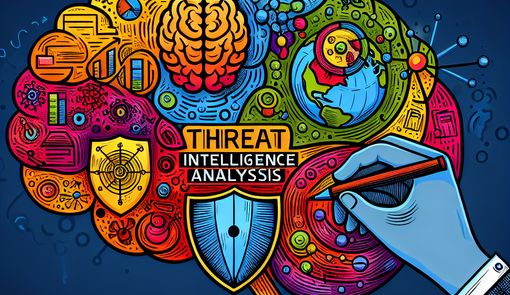Threat Intelligence Analyst
A Threat Intelligence Analyst is responsible for analyzing and interpreting data related to cyber threats to protect an organization's information systems.

Top Articles for Threat Intelligence Analyst
Sample Job Descriptions for Threat Intelligence Analyst
Below are the some sample job descriptions for the different experience levels, where you can find the summary of the role, required skills, qualifications, and responsibilities.
Junior (0-2 years of experience)
Summary of the Role
As a Junior Threat Intelligence Analyst, you will support our cybersecurity team by monitoring and analyzing cyber threats that could impact our organization. You'll work alongside experienced analysts to improve our security posture by collecting, evaluating, and disseminating intelligence about potential threats, vulnerabilities, and cyber-attacks.
Required Skills
- Knowledge of cybersecurity principles and practices.
- Familiarity with threat intelligence platforms and tools.
- Proficiency in data analysis and interpretation.
- Capability to work collaboratively in a team environment.
- Attention to detail and ability to manage multiple priorities.
Qualifications
- Bachelor's degree in Cybersecurity, Information Technology, Computer Science, or a related field.
- Understanding of cyber threats, attack techniques, and the cybersecurity landscape.
- Ability to obtain a security clearance, if necessary.
- Strong analytical and problem-solving skills.
- Excellent communication skills, both written and verbal.
Responsibilities
- Monitor various sources of threat intelligence, including social media, deep web and dark web, for potential cyber threats to the organization.
- Analyze and interpret data to identify threat patterns and vulnerabilities.
- Assist in the development of threat intelligence reports that communicate the results of the analyses to various stakeholders.
- Collaborate with other cyber security team members to integrate threat intelligence into the organization's security strategies.
- Stay up-to-date with the latest cybersecurity trends and threats.
- Participate in the ongoing improvement of threat intelligence tools and processes.
Intermediate (2-5 years of experience)
Summary of the Role
The Threat Intelligence Analyst is responsible for analyzing and interpreting intelligence related to cyber threats. This individual will work to understand the tactics, techniques, and procedures of threat actors and provide insights to help protect the organization's information systems.
Required Skills
- Strong analytical and critical thinking skills.
- Proficiency with intelligence analysis tools and platforms.
- Knowledge of cyber threats, attack methods, and mitigation techniques.
- Excellent communication and presentation skills.
- Ability to work in a high-pressure environment.
Qualifications
- Bachelor's degree in Cybersecurity, Computer Science, Information Technology, or related field.
- 2-5 years of experience in cybersecurity, specifically in threat intelligence or a related discipline.
- Familiarity with cybersecurity frameworks and standards (e.g., NIST, MITRE ATT&CK).
- Certifications such as Certified Information Systems Security Professional (CISSP) or Certified Ethical Hacker (CEH) are advantageous.
Responsibilities
- Monitor and analyze intelligence data from multiple sources to identify threats.
- Analyze threat campaign(s) and intrusion sets utilizing multiple frameworks.
- Produce threat intelligence reports and briefings for internal stakeholders.
- Provide recommendations for threat mitigation strategies.
- Collaborate with cybersecurity teams to enact defensive measures.
- Stay current with emerging threats and industry trends.
Senior (5+ years of experience)
Summary of the Role
As a Senior Threat Intelligence Analyst, you will be responsible for analyzing and interpreting various forms of data to identify potential threats to an organization's cyber infrastructure. You will play a critical role in shaping the cybersecurity strategy by providing insights into the latest trends and tactics used by cyber adversaries.
Required Skills
- Analytical skills with the ability to analyze complex data and draw meaningful conclusions.
- Proficient in cyber threat intelligence analysis methodologies.
- Excellent verbal and written communication skills for effectively conveying threat intelligence to a variety of audiences.
- Ability to work in a fast-paced environment and manage multiple tasks simultaneously.
- Strong problem-solving skills and the ability to think critically and strategically.
- Staying current with the evolving threat landscape and emerging technologies.
- Collaborative team player with strong interpersonal skills.
Qualifications
- Bachelor's degree in Cybersecurity, Information Technology, Computer Science, or a related field.
- 5+ years of experience in cybersecurity, ideally with a focus on threat intelligence or incident response.
- Strong understanding of cyber threat actors, tactics, techniques, and procedures (TTPs).
- Experience with security information and event management (SIEM) systems, threat intelligence platforms, and other relevant cybersecurity tools.
- Experience with programming/scripting languages such as Python, SQL, or similar, for threat research and analysis.
- Certifications such as Certified Information Systems Security Professional (CISSP), Certified Ethical Hacker (CEH), or GIAC Security Essentials (GSEC) preferred.
- Active security clearance or ability to obtain one may be required depending on the employer.
Responsibilities
- Perform in-depth analysis of cyber threats, including determining the nature, scope, and potential impact of security incidents.
- Monitor and analyze threat intelligence feeds to remain up-to-date with the latest threats and vulnerabilities.
- Develop comprehensive threat intelligence reports and briefings for both technical and non-technical stakeholders.
- Advance the organization's threat modeling and intelligence capabilities to proactively identify risks.
- Collaborate with security operations and incident response teams to mitigate identified threats in a timely manner.
- Contribute to the continuous improvement of threat intelligence tools, practices, and procedures.
- Provide mentoring and guidance to junior intelligence analysts to develop their expertise.
- Liaise with external organizations, including law enforcement and other threat intelligence groups, to share information and coordinate responses to emerging threats.
See other roles in Science and Technology and Technology






